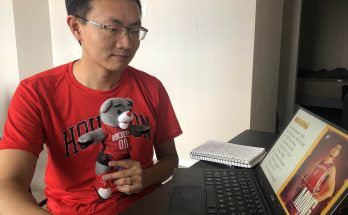The best part of being in the United States of America for the first time is having a lot of first times.
Last week I had that first time experience on two occasions. I went for the first time to Texas where I attended journalism conference, for the first time in USA.

The Excellence in Journalism Conference once a year brings around- both young and professional- journalists together. The main goal of conference is to expand journalistic skills, trough lineups of workshops, panel discussions and talks. But don’t forget, skills without connections and networking doesn’t worth much, and the EIJ Conference is a great opportunity to gain connections and to network with colleagues in order to reach potential career change and future goals.
Talk that really caught my eye and made me think about my attitudes afterwards was Aim High: Getting to the Top Job in the Newsroom.
Chip Mahaney – a veteran journalist and experienced news leader of both broadcast and digital news – and Carrie Hoffman – a long-time news director – gave 10 advices that I truly believe it is important to share.
Two golden rules from which everything starts are super simple:
- Never let your boss be surprised,
- Never expect your boss to adapt to your style of management.
If you understood these two golden rules, now’s the time for “fine tune” rules:
- Your relationship with your general manager is critical. You have to keep your news director informed about the work you’re managing, because that is the best way to turn your ideas into actions. But identify how often and how much your boss wants to know. Don’t be boring but also don’t forget that your job is to ask your boss to give you a feedback. NEVER ask out loud in the newsroom what is my News Director doing all day, why is she never in the newsroom. The answer is simple: these people manage RELATIONSHIPS, whereas you manage content and people within newsroom on daily basis.
- Being a newsroom leader puts you on the stage all the time. People just look at you differently. And if you act different then usual people immediately think they are the problem. The same rule applies when someone is talking to you in your office. That person steps on the stage as well. NEVER FORGET: there are no secrets in newsroom.
- Always stick to the ethical values, especially in the breaking news situations. Get your team in and discuss about ethics. Use open questions. The more you practice this approach, the more skilled in decisions you become and newsroom becomes more aware about it. Even if the things you decide in the end go wrong at least you can explain what happened if there was discussion. NEVER DO: never leave your newsroom out of decision, involving means learning and discussing. Ethics go better with the team!
- Hiring people is your #1 time suck because at least 30% of your time goes to recruiting, making interviews, checking applicants references and recommendations. You owe to your staff to bring good “fresh blood” to your newsroom.
- Managing people, your other #1 time suck. It is always something to someone, family problems, car accidents, death of pet, whatever… but you have to deal with it. This is where 60% of your time goes. Manage people, not the content. Approach to them individually. Reach to your team as well, work on brainstorm let them express their ideas. Their success is your success as well.
- Finance people are your friends. You don’t have to be finance expert but grow good relationship with finance people department. Obey their deadlines and they will help you. It is their job to make numbers functional and to advise you. Ask for the options. In case of unpredictable events, inform them ASAP, as soon as you do it you have someone who is getting you back on track.
- Make decisions or delegate them. In the end someone has to make a decision and usually you’re the one. Make it as soon as possible because waiting is making things worse. Don’t let all decision go trough you. Your best plan is to develop your team to make decision and when that is ok to act on their own. Set the boundaries which decisions you’re taking, which decisions have to be discussed with you, and which decisions they can make on their own. NEVER FORGET: budget is always your decision!
- Take care of #1- YOURSELF! It is impossible to be available 24/7. It doesn’t get easier when you’re on top. If you don’t take care of yourself you’re risking a burnout. Show your crew that you trust them, but also take care for yourself in order to be better for your team. Try to setup the newsroom so you can enable your team members to do the same.
- Developing your successor. Play the role of mentoring. Give the opportunity to members of your to learn things from you. Grow someone that can be your next one. Show them you’re really boss worthy by opening a chance to learn.
- What role boss has to play? Someone has to be the hard guy. Not only mom of the newsroom. Be honest when it comes to money and raises. Plan ahead how to transfer money and award the ones that deserve. Keep your humanity but be strict.

So now, when you know how most of our bosses are thinking I will conclude with tips and tricks for future conferences:
- There was no respectable media that didn’t participate on EIJ Conference- CBS, NBC, CNN, FOX, The New York Times, Wall Street Journal, Vox, Axios, Huffington Post, Reuters… use that opportunity to approach people, browse ahead participants, see what are their latest trends and successes, it will help you approach them and start conversation.
- Be prepared to present yourself. Bring your CV and couple of samples of your work. Flash drive takes 10% of your pocket and can bring you turn of your life. These conferences are also job fairs, recruiters are browsing around. Don’t be afraid and timid to initiate open conversation about your wishes, this is super useful for pursuing PA’s!
- Even if you see that there is no opportunity for PA you always can ask for “newsroom shadowing” if you’re interested in some newsroom even couple of days of visit can be useful, and maybe key for PA if they get to know you better.
- Bring a lot of your business cards, swap them with people, add them on LinkedIn, be visible. Try to keep contact. Ask your mentors if they know some of those people.
- Make research of schedule in advance, there is a lot of things happening at the same time. Browse who are the participants of panels, talks etc… sometimes things sounds more interesting/ boring than they truly are. Don’t hesitate to leave panel and transfer to other. Usually it last 2 hour there is plenty time to catch up with new one. Workshops are great but usually they last almost all day so be careful when deciding on taking workshops in order not to loose 3-4 opportunities to hear something different that day or meet more people.



Lastly, don’t forget, conferences are not just for work. Usually after 4 or 5 pm there are receptions and social events. Use them as the opportunity to meet people as well. Browse about general interesting things in the city where conference is being held.
Why? Let’s just say that Alamo is a piece of history, the Riverwalk is gorgeous, and food and music are great. The rest of it you will have to discover on your own for your cities and conferences.




